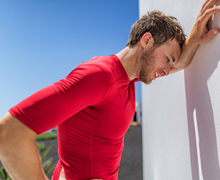
Some days you feel like exercising more than others and a new study may shed light on why. Researchers at the University of Pennsylvania found a direct connection between gut bacteria and the motivation to exercise.
Certain gut microbes activate nerves that have the ability to promote the desire to exercise. That’s what scientists from the Perelman School of Medicine at the University of Pennsylvania wrote about in the journal Nature.
Researchers used mice specifically bred for exercise and found the difference in running performance was attributed to the presence of certain gut bacteria in the higher-performing mice. Those bacteria produce small molecules called metabolites that stimulate specific sensory nerves in the gut. Those nerves in turn affect the region of the brain that control motivation during exercise.
"If we can confirm the presence of a similar pathway in humans, it could offer an effective way to boost people's levels of exercise to improve public health generally," said study senior author Christoph Thaiss, Ph.D., an assistant professor of Microbiology at Penn Medicine.
Thaiss and colleagues were searching for factors that affect exercise performance and studied a broad range of possibilities. They recorded things such as genomic sequences, types of gut bacteria and bloodstream metabolites in the mice. They also measured the amount of daily voluntary wheel running for the mice as well as their endurance.
Through machine learning they were able to determine genetics played only a small factor in the performance differences between the mice. Researchers discovered gut bacteria was much more important. A factor they confirmed when they gave some mice broad-spectrum antibiotics which cut their running performance in half.
"This gut-to-brain motivation pathway might have evolved to connect nutrient availability and the state of the gut bacterial population to the readiness to engage in prolonged physical activity," said study co-author, J. Nicholas Betley, Ph.D., an associate professor of Biology at the University of Pennsylvania's School of Arts and Sciences. "This line of research could develop into a whole new branch of exercise physiology."
Researchers are now going to explore if the same processes happen within the human body in an effort to help create protocols for helping people with a range of behaviors tied to the same brain region. In addition to exercise, scientists believe this could also be used for people suffering from depression or even controlled by addiction.
